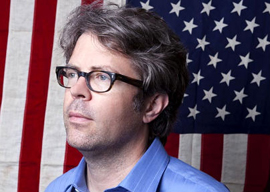
July 05, 2011

Jonathan Franzen
Freedom by Jonathan Franzen came out last year, but since it has been called the novel of the century, I suppose it is still relevant.
Freedom is what is now called a “literary novel”; even an “ambitious literary novel,” as the author himself would describe it. Certainly its author is ambitious, and it is filled with ambitious characters.
Julien Sorel, the hero of Stendhal’s Le Rouge et le Noir, was an ambitious character, which led him to ask himself how one should live. Joey Berglund, one of Freedom’s characters, is ambitious too, which leads him to ask himself how he can make a living, and fast.
So he buys spare parts that he sells to the Army, though he knows they are not the ones they need, and the Army buys them without checking anything but their bulk. Do they fit the Jeeps they are meant to fix? Who cares? They have the right weight.
Is Freedom an important novel? It sure weighs like one.
Let us leave it aside and turn to its author, for Franzen may be a better character than any he’s put on paper. His interviews are highly entertaining, sprinkled with gems such as: “Strong Motion was a novel written by a person to whom things were happening as he wrote it.”
He talks of “finding an audience” with the fervor that Christian mystics reserve for the Holy Grail. And like a pretty girl confessing with a shy smile that she loves flowers and teddy bears as though she were revealing a startling idiosyncrasy, he modestly discloses that what really drives him is “the story” and that he’s just “serving the characters.”
“If the novelist is free,” asked professor René Girard, “how can his characters be?…What is impossible to God cannot be possible to the novelist. Either the novelist is free and his characters aren’t, or the characters are free, and the novelist, like God, does not exist.” The conceit of free-willed characters is irrelevant, but the existence of free-willed novelists is essential.
When people say that America is the land of the free, I think they mostly mean that we are free to compete. The possibility of winning exists in theory for all; or as Franzen’s buddy David Foster Wallace would say, there are situational modalities of obtaining success.
Side by side on the bookstore table, Freedom by Jonathan Franzen, lay next to Fate, Time, and Language: An Essay on Free Will by David Foster Wallace. One writer was incensed by all; the other self-immolated.